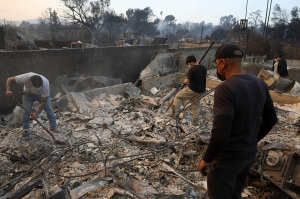How Do We Respond to the Question 'What About Rape and Incest?'
Republican Todd Akin is standing firm. He has refused to bow to pressure to withdraw his candidacy for the U.S. Senate after he made a comment that Gary Bauer of The Campaign for Working Families called, "a gift to our political enemies."
When the Missouri Congressman was asked by a St. Louis TV station to state his views regarding possible exceptions for abortion, he responded, "If it's a legitimate rape, the female body has ways to try to shut that whole thing down." He added: "But let's assume that maybe that didn't work or something. You know I think there should be some punishment, but the punishment ought to be on the rapist and not attacking the child."
For all his good intentions of trying to put the focus on the right to life of the unborn, Akins' use of the phrase "legitimate rape," which he later called a "misstatement," and for which he apologized and asked for forgiveness, has resulted in fierce castigations from Democrats and the liberal media. It has also brought calls from his fellow Republicans to withdraw from the race against incumbent Claire McCaskill.
Ann Coulter wrote, "If Akin truly loves his country and genuinely wants Roe v. Wade overturned, he will step aside and allow another Republican to run in his place."
Coulter and others have said Akin should have been better prepared to respond to the question.
"How about saying," she offered, "'Yes, it's still a life, but more people are killed in drive-by shootings in Chicago every year. You give us the 2 million abortions that aren't a result of rape and incest and we'll give you the few thousand that are.'"
Coulter was correct in pointing to the huge number of deaths every year at the hands of abortionists. But her response still misses the mark on two points.
As lawyer Rebecca Kiessling, who was herself conceived in rape, says, "Rape exceptions in the law actually put the government in the position of having to ascertain when the child was conceived, who the father is, whether the child was conceived during the alleged rape or during intercourse with her husband or boyfriend, and if the child was conceived during the time frame of the alleged rape, then the government would need to determine whether the sexual intercourse was consensual or not."
According to Kiessling, the "rape exception" only perpetuates injustice against rape victims whose accounts are viewed with skepticism. She says that "it further leaves the majority of impregnated rape victims wholly unprotected under the law. Rape exceptions suggest that a 'real rape victim' couldn't possibly love 'the rapist's baby' and that rape victim mothers don't exist."
This assumption was expressed by Susan Milligan in U.S. News and World Report. She called children conceived through rape, "spawn." Such comments deserve as stern a rebuke as Akin's do. No child is any less human because he or she was conceived during a rape. Such a claim denies the biblical truth that all children-including the unborn-are created in the image of God. The circumstances of their conception are irrelevant. The baby in the womb is an innocent human person whose inalienable right to life must be protected just as much the baby outside of the womb.
Coulter's response also overlooked the fact that abortion itself is a traumatizing experience. The truth is: abortion hurts women. Giving a woman the abortion option-whether she is the victim of a rape or a married woman with unplanned pregnancy-is not the "compassionate answer." Abortion does not bring healing; it brings misery, pain, and suffering, as millions of women who have had abortions can attest.
After 39 years of legal abortions in America, the statistics on the effects of abortion on women are nothing short of tragic:
•65 percent of women who abort report symptoms Post-Traumatic Stress Disorder that they attribute to their abortions.
•Women who abort have a 62 percent higher risk of death from all causes for at least eight years after their pregnancies.
•Suicide rates in women are 6–7 times higher after an abortion.
Supporters of the abortion industry want to hide the truth that abortion is harmful to women. Every woman considering having an abortion should be told the fact that 31percent of women who have abortions suffer health complications afterwards.
•Women who abort are twice as likely to have pre-term or post-term deliveries in subsequent pregnancies.
•Women who abort are more likely to experience infertility, stillbirths, and miscarriages.
•Women who abort have a significantly increased risk of breast cancer and cervical cancer.
(See the Elliot Institute's Life-Threatening Risks of Abortion)
As Rebecca Kiessling observes, Rep. Akin is not the first political candidate to have run afoul of the media over the question, "What about rape and incest?" "The problem," she says, "is not with these candidates' values. The problem is how they express them."
Kiessling says candidates should respond to the question by giving the following three-part answer:
First, according to the Supreme Court, the death penalty is "cruel and unusual punishment" and rapists don't deserve the death penalty. However, if the rapist father doesn't deserve such punishment, how can we say that the innocent child conceived in rape deserves to die for the crimes of her father?
Second, Keissling points out, rape victims are four times more likely to die within the next year after the abortion, with a higher rate of suicide, murder, drug overdose, etc.. "If we truly care about rape victims," she says, "we should protect them from the rapist, and from the abortion, and not the baby. A baby is not the worst thing that could ever happen to a rape victim-an abortion is."
Finally, notes Kiessling, rape victims choose abortion at half the rate of the average unplanned pregnancy, which is over 50 percent. "Only 15-25 percent of rape victims choose abortion…. The majority of rape victims choose to raise her child - not 'the rapist's baby'-HER child."
At her website, Rebecca has gathered stories of women who became pregnant by rape and either regret aborting, are raising their children, or are birth-moms. She also has stories of those who were conceived in rape and/or incest.
The answer to the question, "What about rape and incest?" is clear-and it's not abortion. Two wrongs do not make a right.





























